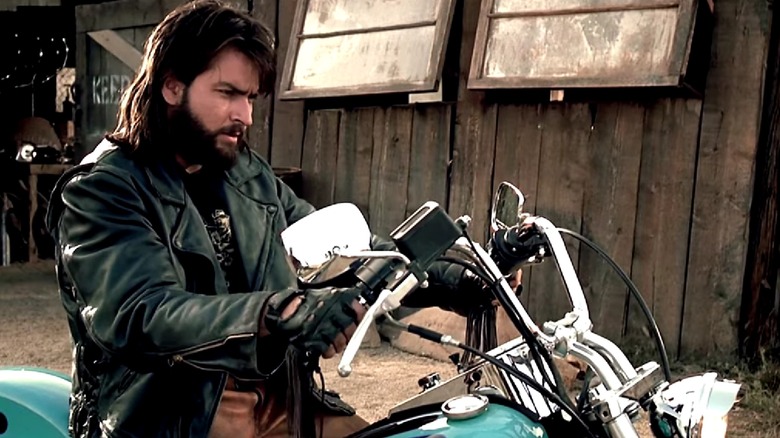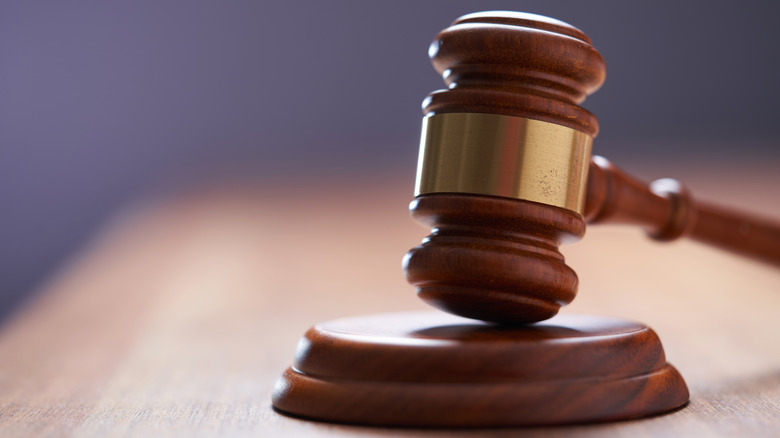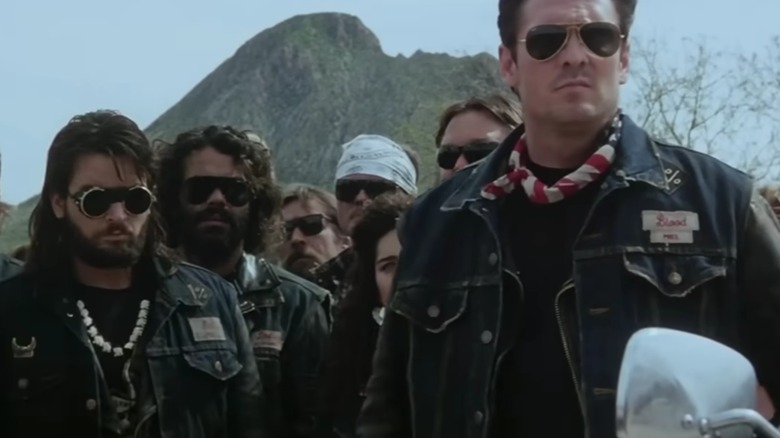What Motorcycle Club Was Charlie Sheen's Beyond The Law Based On?
In "Beyond the Law," Charlie Sheen stars as Daniel Saxon, a police officer who goes undercover to take down an Outlaw Motorcycle Club (OMC). The longer Saxon spends undercover, the less defined the line between lawful and unlawful becomes for him. There's a cast of other notable actors, such as Courtney B. Vance, Linda Fiorentino, and Michael Madsen, but the real clincher with Sheen's role is that it was based on a true story. The lesser-known film featured an Outlaw Motorcycle Club (OMC) called the Jackals, whereas the real-life Saxon, an undercover officer named Dan Black, infiltrated one of the big four Outlaw MCs: The Hells Angels.
Sheen's Daniel Saxon loses his job as a police officer but is recruited by Arizona's State Attorney's office to infiltrate the Jackals. Saxon learns the ins and outs of motorcycles, changes his appearance, creates an alter ego, and gradually earns the trust of the Jackals' leader, Blood. Because it's Hollywood, there's a small romance storyline thrown into the mix, too. Spoiler alert: there's a happy ending for the lovebirds, and the bad guys end up in prison for three lifetimes.
Going undercover is an especially dangerous role for law enforcement because being discovered by the people they're trying to subvert can mean certain death. Unlike most of Hollywood's unrealistic stories, criminals don't keep the heroes alive long enough to spill their entire plan, only for the cavalry to show up and save the day.
How Beyond the Law's true story ended up in court
In 1982, Playboy Magazine published a story entitled "Undercover Angel" that described undercover agent Dan Black's brief infiltration of the Hells Angels OMC. A lawsuit eventually came out of this, as the Hells Angels weren't happy with the way its club, specifically the wives of members, was depicted in the article.
The events in the article were rather explicit, as one would expect from something published by Playboy. Long story short, the article painted a graphic picture involving Hells Angels brides and mommas. The OMC argued that the depictions were inaccurate and defamed certain parties within the club and argued that Playboy had done so with malicious intent. However, the case was thrown out because nobody from or related to the club was personally named, nor could the plaintiffs prove that the story was published with malicious intent.
There is an of-and-concerning clause in defamation cases. Since these types of cases threaten freedom of speech and of the press, plaintiffs need to be able to point to a specific person being named to bring a case forward. The court decided that the article's use of Hells Angels brides and mommas was not specific enough to meet the of-and-concerning requirement. The Hells Angels is the largest motorcycle club in California; without anybody being named specifically, it was an uphill battle for the plaintiffs in this case.
How accurate was Beyond the Law and other productions?
Pat Matter, founder and former Hells Angels president of its Minneapolis chapter, sat down with Business Insider to rate the accuracy of certain events seen in different TV shows and movies that feature motorcycle clubs. Matter lived the life of an outlaw for around 31 years and received a 17-and-a-half-year prison sentence for his crimes, giving him some authority on the matter. It's not uncommon for OMC members to consult on the set of major Hollywood productions, including "Sons of Anarchy," "A Bronx Tale," "The Bikeriders," and even "Beyond the Law." In some of these productions, MC members even got to be on screen either as extras in the background or as OMC members for a scene.
Matter critiqued a couple of scenes from "Beyond the Law," rating their accuracy. Naturally, he discussed the probability of undercover agents infiltrating clubs like The Hells Angels. While he didn't mention the true story the film was based on, he did mention Jay Dobyns and Anthony Tait, two law enforcement agents who infiltrated the club and weren't discovered until they were involved in raids on the club. He rated the film between a nine and 10 for how accurate its portrayal of undercover cops was.
He also rated certain scenes from "Sons of Anarchy," saying that while getting into a shootout on a highway while riding is unlikely and especially difficult, gun running was a common crime for The Hells Angels and other clubs. Even being attacked by rival clubs at a clubhouse wasn't unheard of.


